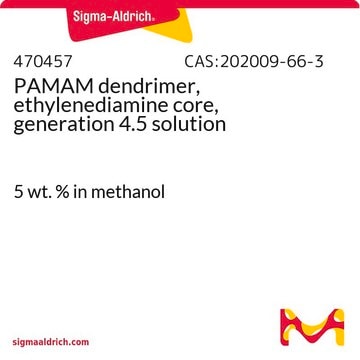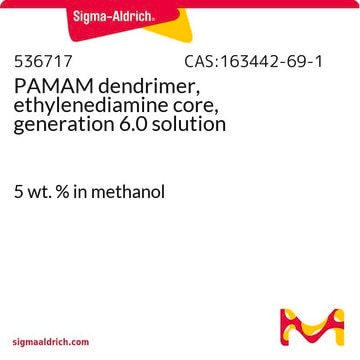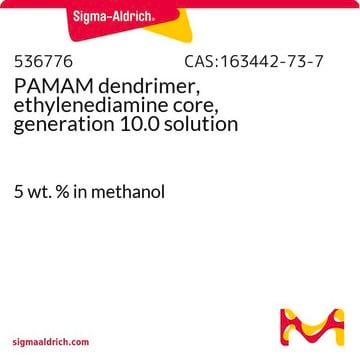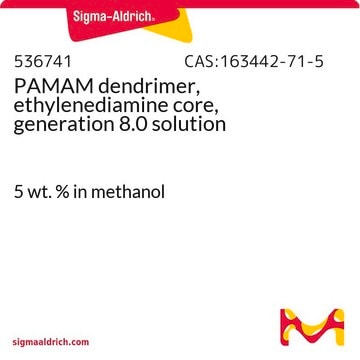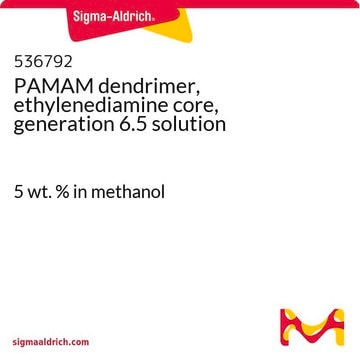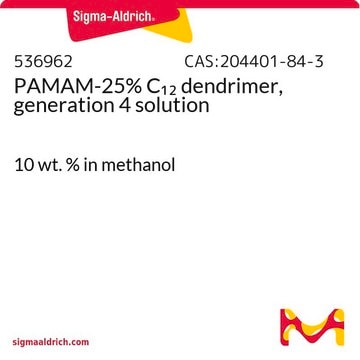536709
PAMAM dendrimer, ethylenediamine core, generation 5.0 solution
5 wt. % in methanol
Synonym(s):
Poly(amidoamine)
Sign Into View Organizational & Contract Pricing
All Photos(1)
About This Item
Linear Formula:
[NH2(CH2)2NH2]:(G=5);dendri PAMAM(NH2)128
CAS Number:
Molecular Weight:
28824.81
MDL number:
UNSPSC Code:
12162002
NACRES:
NA.23
Recommended Products
description
amino surface groups
Quality Level
form
liquid
mol wt
generation 5.0
feature
core type ethylenediamine core (2-carbon core)
concentration
5 wt. % in methanol
no. Surface Groups
128
density
0.797 g/mL at 25 °C
storage temp.
2-8°C
General description
PAMAM dendrimers are water-soluble, non-immunogenic, and biocompatible symmetrical polymers. They possess a large quantity of modifiable terminal functional groups that can bind to various targeting or guest molecules. These terminal groups are used to covalently attach drugs, targeting ligands, or imaging agents for targeted delivery, controlled release, or imaging applications.
Application
- Synthesis of beta-Cyclodextrin-Decorated Dendritic Compounds Based on EDTA Core: This study presents an alternative to the ethylenediamine core in PAMAM dendrimers, using an EDTA core instead, providing insights into modifications that affect the dendrimers properties (Gonzalez Mendez et al., 2022).
- New Advances in General Biomedical Applications of PAMAM Dendrimers: Discusses the composition variations of PAMAM dendrimer cores, including ethylenediamine, and their implications on biomedical applications (Araujo et al., 2018).
- Poly (amidoamine) Dendrimers: Covalent and Supramolecular Synthesis: This paper reviews various synthetic strategies for PAMAM dendrimers, emphasizing the role of the ethylenediamine core in their structural formation (Lyu et al., 2019).
- Modified Carboxyl-Terminated PAMAM Dendrimers as a Cytocompatible Nano Based Drug Delivery System: Examines the biocompatibility and drug delivery efficiency of modified PAMAM dendrimers, highlighting the cores critical role (Vu et al., 2019).
- Use of Polyaminoamide Dendrimers Starting from Different Core-Initial Molecules for Inhibition of Silica Scale: This study explores the use of ethylenediamine-core PAMAM dendrimers in industrial applications, particularly for silica scale inhibition (Sun et al., 2021).
Physical form
Contains 128 surface primary amino groups.
Legal Information
Manufactured by Dendritech®, Inc.
Dendritech is a registered trademark of Dendritech, Inc.
Signal Word
Danger
Hazard Statements
Precautionary Statements
Hazard Classifications
Acute Tox. 3 Dermal - Acute Tox. 3 Inhalation - Acute Tox. 3 Oral - Flam. Liq. 2 - STOT SE 1
Target Organs
Eyes
Storage Class Code
3 - Flammable liquids
WGK
WGK 3
Flash Point(F)
49.5 °F - closed cup - Methanol
Flash Point(C)
9.7 °C - closed cup - Methanol
Choose from one of the most recent versions:
Already Own This Product?
Find documentation for the products that you have recently purchased in the Document Library.
Customers Also Viewed
The effect of PAMAM dendrimer generation size and surface functional group on the aqueous solubility of nifedipine
Bharathi Devarakonda, et al.
International Journal of Pharmaceutics, 284, 133-140 (2004)
Zhao-Jun Liu et al.
PloS one, 11(4), e0154053-e0154053 (2016-04-23)
Stem cell therapy has emerged as a promising approach for treatment of a number of diseases, including delayed and non-healing wounds. However, targeted systemic delivery of therapeutic cells to the dysfunctional tissues remains one formidable challenge. Herein, we present a
Catriona H Edwards et al.
Scientific reports, 10(1), 12422-12422 (2020-07-28)
In this study, the use of dendrimer-coated carbon nanotubes (CNTs) as a delivery vehicle for dsRNA was assessed in Tribolium castaneum. Exposure to low dosages of polyamidoamine dendrimer carbon nanotubes (PAMAM-CNTs) did not affect T. castaneum larval mortality. Expression of
Drug release characteristics of PAMAM dendrimer?drug conjugates with different linkers
Yunus E. Kurtoglu, et al.
International Journal of Pharmaceutics, 384, 189-194 (2010)
Roberta Risoluti et al.
Journal of pharmaceutical analysis, 10(4), 351-355 (2020-09-15)
In this work, functionalized carbon nanotubes (CNTs) using two polyamine polymers, polyethyleneimine (PEI) and polyamidoamine dendrimer (PAMAM), were investigated by thermal analysis in order to address preparation strategies to obtain low cytotoxic compounds with the ability to conjugate microRNAs and
Our team of scientists has experience in all areas of research including Life Science, Material Science, Chemical Synthesis, Chromatography, Analytical and many others.
Contact Technical Service


